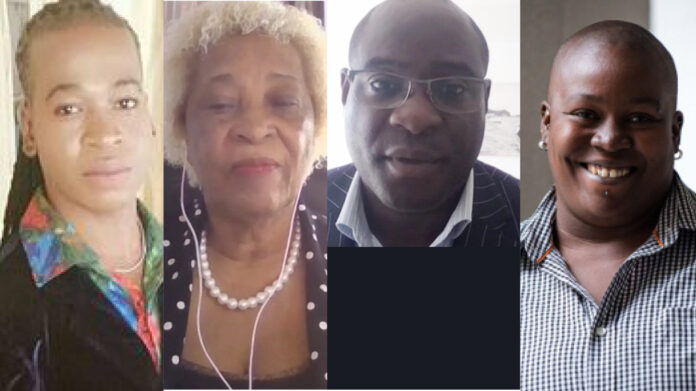
By Makeida Antonio
The potential effects of the repeal of the country’s controversial anti-buggery law were discussed yesterday during an online press conference by several groups directly involved in the landmark ruling
The judgement was handed down in the High Court on Tuesday after it was found that the law which criminalises same-sex intimacy was unconstitutional.
Attorney Andrew O’Kola, led by Senior Counsel Douglas Mendes, represented claimants Orden David and Women Against Rape (WAR) President Alexandrina Wong who challenged the constitutionality of sections of the Sexual Offences Act 1995.
David is the President of MESH, an NGO which seeks to meet the emotional and social needs, through education and support services, of marginalised and vulnerable people, especially the LGBTQ community.
David expressed his gratitude to the legal team, plus MESH, WAR and human rights body the Eastern Caribbean Alliance for Diversity and Equality (ECADE), who worked hard to secure the ruling.
“I also feel very positive within myself that this judgement will bring benefits to persons of every sexuality and gender identity,” he said.
“I know this law is very archaic but it is a very clear statement that we must stop the stigma and discrimination against persons within our community,” he remarked during his statements.
Meanwhile, Wong emphasised the reduced stigma and discrimination ahead when asked how a change in the law would enhance access to HIV healthcare for members of the LGBTQ community.
“Because of the experiences that people within the community would have had, persons are fearful and apprehensive to seek care from mainline service providers, and so instead of the person going in to know what their status is, encouraging their partner to have a test, they don’t [want to] because of fear of reprisal,” she said.
“We have to recognise that HIV, from way back, was tagged as a disease of immorality. No one wants to be seen as an immoral person,” she argued.
ECADE, a major player in the movement to end discrimination across the Eastern Caribbean, has been involved in the last six years of the seven-year litigation process, which is still underway in several neighbouring islands.
Although custodial sentences are rarely imposed, those convicted under laws banning same-sex acts can technically face sentences ranging from 10 years to life imprisonment. Other constitutional challenges in Barbados, St Kitts and Nevis, and St Lucia are expected to be concluded before the end of the year.
ECADE’s Executive Director Kenita Placide said she understands that backlash will be a part of every step of the process to dismantle archaic colonial-era laws, but she remains hopeful that discriminatory attitudes will change.
“We in the Caribbean pride ourselves as religious people but sometimes we don’t recognise when our acts and our behaviours are not so religious, and I think these are the things we need to constantly call into the spotlight,” she said.
Placide added that while it is not yet clear what kind of religious backlash will occur in Antigua and Barbuda, she noted that there are some religious leaders who are supportive of LGBTQ community members.
